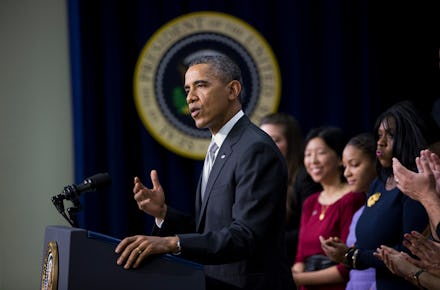How Our Employer-Based Health System Made Obamacare Weak Sauce

Call it Great Recession shock, but it's difficult to remember a time when employers didn't hold all the good cards, when unions weren't being busted left and right, and when businesses didn't compete over who could squeeze the most out of their employees. It's difficult to remember a time when you were lucky to get full-time work at all, much less work with benefits of any kind.
But there was such a time.
World War II had just ended. The world was in shambles, and the American industrial sector stepped in to pick up the slack. Business was booming, and more importantly, it was hiring. But while the United States emerged from the war relatively unscathed, our casualty count was close to half a million — and almost entirely consisting of able-bodied young men. In a scenario that seems unimaginable today, there weren't enough workers to meet all the jobs being created, and businesses were the ones competing for employees.
Good times, those were.
But there was one additional wrinkle. Wage and price controls instituted during the war meant businesses couldn't offer competitive salaries to attract workers. But in an unexpected decision, the War Labor Board ruled that "benefits" didn't count as wages; companies could offer them to their hearts' content. And so they did. Soon, robust health care packages became a common, employee-enticing offer.
As long as unemployment stayed low, this amounted to near-universal health care.
At the time it felt like a huge victory for workers, and it was — but only under such unique circumstances. Antiquated economic regulations, a marketplace that looks nothing like today's, and a goddamn world war had to conspire in order to make the pieces fit just right. Fast-forward to today, and all that remains is the legacy of employer-based health insurance, an accident of history that no longer makes sense when workers don't have the leverage they once did.
That the American health care system doesn't work is obvious. Proposed solutions vary wildly, but nobody denies that even those Americans who can afford health care are spending far more than their peers in the rest of the industrialized world, without a comparable increase in quality or life expectancy to show for it. Today, the debate over what to do about it tends to be characterized in terms of total deregulation vs. increased intervention, specifically something like President Barack Obama's much-maligned Affordable Care Act (ACA).
Yet both of these positions operate under the larger legacy of employer-based health care, and as long as most Americans don't realize how unique or accidental this legacy is, even "liberal" solutions will remain fundamentally tied to a distribution system that only made sense in very bizarre times.
Consider what Obamacare — the ostensible "left-wing" solution — actually does. At its core is not an effort to change the relationship between employers and employees, but rather an effort to mitigate the worst consequences of this system. The ACA requires employers to provide a minimum standard of coverage to full-time employees; through exchanges and subsidies, it helps the unemployed and underemployed afford some private coverage on the individual market.
While these reforms do some marginal good, they reinforce a larger, and fundamentally conservative worldview: that basic health care is not a right (as the rest of the industrialized world sees it), but a "benefit" given to those lucky enough to find work.
Such inside-the-system reform has been typical of the Obama administration and Democratic strategy in general: seeking short-term tactical victories that (sort of) optimize worker outcomes within the existing system, while refusing to address larger structural issues. While this certainly helps some people in the immediate picture, it doesn't get at the core of the problem.
Worse, it lends credence to the basic conservative worldview. If both poles of "reasonable" opinion start from the premise that health care is a privilege, then the Right has already won the basic argument, leaving the Left's ultimate aim — adopting a system like the rest of the civilized world did a generation ago — seeming more and more "radical" and pie-in-the-sky.
We have to break this cycle. Difficult as it may be, the only way to do that is to sacrifice some short-term gains in order to overturn the health-care-as-a-privilege paradigm. We have to stop legitimizing the idea that health care is not part of the basic social contract, which we have done in order to get slightly more affordable coverage for some Americans today.
Will this leave some of today's workers worse off while we fight the uphill battle for deeper reform? Yes. But in the long run, it will benefit everyone, more than current solutions ever could.
The media, biased as ever toward false equivalence, rates the center as the average between the positions of the two major parties. If both parties agree that health care is a benefit, then the center is a dispute over how much the government should help some people get that benefit. But if the Democratic Party dropped its short-term goals and pushed for a fundamental reorientation of how we understand health care — say, by demanding Medicare for all — then after awhile, mainstream consensus would label this the "Democratic position" and presto!, whamo! — universal health care would be a "reasonable" option.
When that happens, and we prevail, our victory won't look like a problematic, ACA-style compromise: It'll look like the most efficient, popular health care distribution mechanism in the country, now available to all Americans. But first, we have to break the accidental legacy of the 1950s, or all the short term, half-fixes in the world will push real solutions even further down the road.